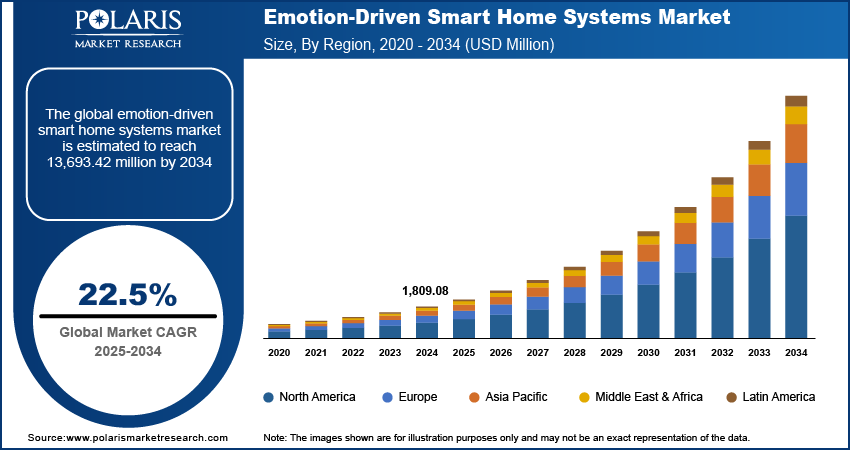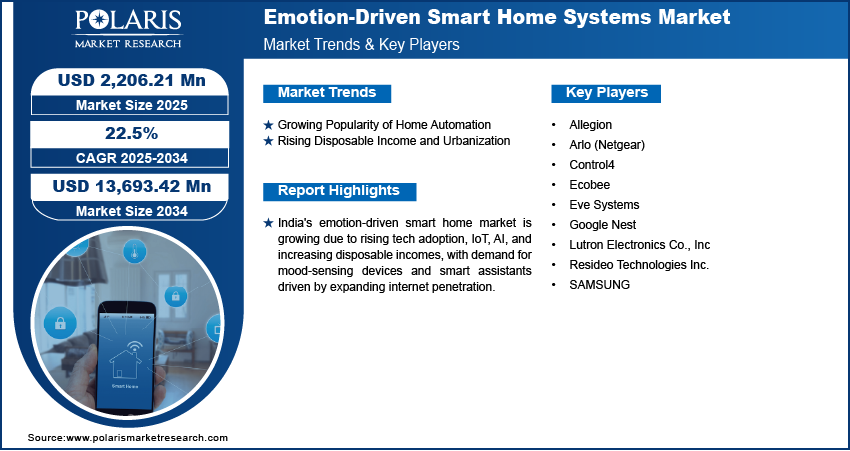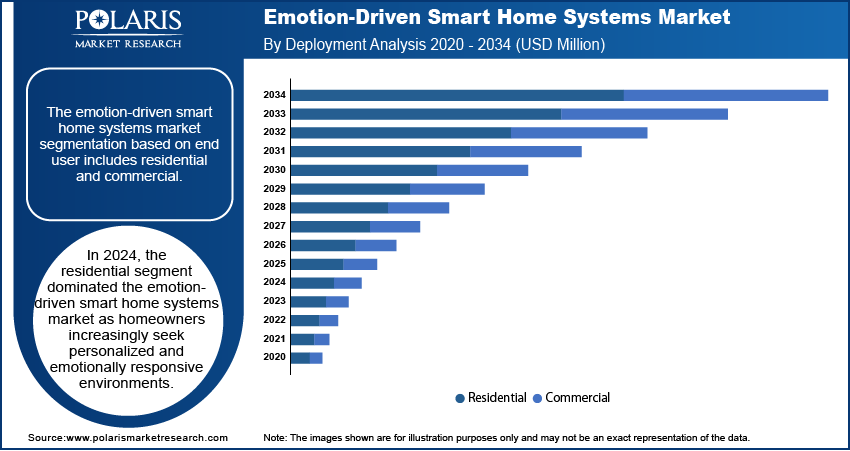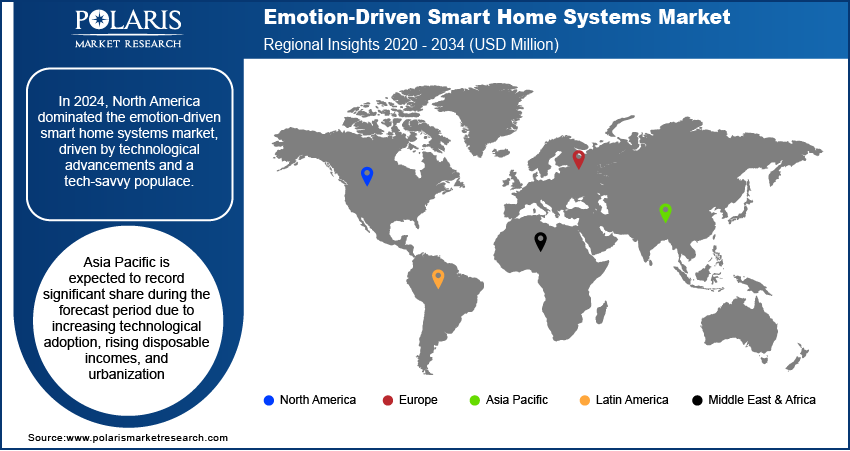
Emotion-Driven Smart Home Systems Market Size, Share, Trends, Industry Analysis Report: By Technology (Artificial Intelligence, Machine Learning, Biometric Recognition, Others), Product Type, End User, and Region (North America, Europe, Asia Pacific, Latin America, and Middle East & Africa) – Market Forecast, 2025–2034
- Published Date:Apr-2025
- Pages: 125
- Format: PDF
- Report ID: PM5545
- Base Year: 2024
- Historical Data: 2020-2023
Emotion-Driven Smart Home Systems Market Overview
Emotion-driven smart home systems market size was valued at USD 1,809.08 million in 2024. The market is projected to grow from USD 2,206.21 million in 2025 to USD 13,693.42 million by 2034, exhibiting a CAGR of 22.5% during the forecast period.
The emotion-driven smart home systems market focuses on AI-powered home automation solutions that respond to users' emotions and moods. These systems utilize sensors, biometric recognition, and machine learning algorithms to analyze facial expressions, voice tone, heart rate, and other physiological signals to adjust home settings such as lighting, temperature, music, and security. The goal is to create a more personalized, comfortable, and intuitive living environment that enhances well-being.
Several factors are driving the growth of this market. Rising adoption of AI and IoT in smart homes is a key driver, enabling systems to learn user preferences and adapt in real time. Increasing demand for personalized living experiences is another major factor, as consumers seek more interactive and responsive home environments. Additionally, advancements in emotional AI and deep learning are making these systems more accurate and efficient, enhancing their appeal.
The market is also benefiting from the growing focus on mental health and well-being, as emotion-driven automation can help reduce stress and improve relaxation. For instance, these systems can dim lights and play calming music when they detect stress signals. Integration with smart assistants like Alexa and Google Home is further expanding the usability of such systems.

To Understand More About this Research: Request a Free Sample Report
The rapid progress in artificial intelligence (AI) and the Internet of Things (IoT) is making emotion-driven smart home systems more intelligent and efficient. AI-powered algorithms are able to analyze biometric data such as heart rate, facial expressions, and voice modulation to understand a user’s emotional state. IoT devices, such as smart sensors and cameras, can communicate seamlessly with home automation systems. These advancements make it possible for smart homes to respond in real time, adjusting the environment based on a person’s mood. Emotion-driven smart home systems will become more accurate and accessible as AI and IoT continue to evolve, driving the emotion-driven smart home systems market growth.
Emotion-Driven Smart Home Systems Market Dynamics
Growing Popularity of Home Automation
Smart home technology has already gained widespread adoption, with devices such as smart speakers, thermostats, and security cameras becoming common. The next step in this evolution is making these systems more intuitive by integrating emotion-detection capabilities. Consumers are looking for smarter, more responsive homes that do not require manual adjustments. Emotion-driven smart home systems meet this need by automatically adapting to users’ emotions, reducing the effort required for home management. The demand for advanced emotion-responsive features is rising as more people are investing in home automation, thereby driving the growth of the emotion-driven smart home systems market.
Rising Disposable Income and Urbanization
Rising disposable incomes and increasing urbanization are supporting more people to invest in high-tech home automation solutions. According to the US Bureau of Economic Analysis, in the US alone, disposable income rose by 0.1% every month in 2024. Urban areas, in particular, experience a growing demand for smart homes equipped with advanced AI-driven systems. Emotion-driven smart home systems attract tech-savvy consumers who prioritize convenience and luxury in their daily lives. Premium home builders are incorporating these features into modern residential projects, further accelerating the growth of the emotion-driven smart home systems market expansion.

Emotion-Driven Smart Home Systems Market Segment Analysis
Emotion-Driven Smart Home Systems Market Assessment by Technology
The emotion-driven smart home systems market segmentation, based on technology, includes artificial intelligence, machine learning, biometric recognition, and others. The artificial intelligence segment is expected to witness significant growth during the forecast period. This growth is due to its role in improving the functionality of smart homes, making them more intuitive and responsive to users' needs. AI-powered systems learn from user behavior, anticipate preferences, and automate tasks such as adjusting lighting, temperature, and security settings. This creates a more personalized and seamless living experience. The AI segment is expected to grow substantially in the coming years as consumers increasingly demand smarter, more efficient homes.
Emotion-Driven Smart Home Systems Market Evaluation by End User
The emotion-driven smart home systems market segmentation, based on end user, includes residential and commercial. The residential segment dominated the market in 2024 as homeowners increasingly seek personalized and emotionally responsive environments. These systems, which adapt to the emotional state and preferences of users, create a more comfortable and connected living space. Features such as mood-based lighting, personalized temperature control, and responsive music or entertainment options improve the overall emotional well-being of residents. Consumers are prioritizing comfort, convenience, and emotional connections within their homes, thereby driving the segmental growth market.

Emotion-Driven Smart Home Systems Market Regional Insights
By region, the study provides emotion-driven smart home systems market insights into North America, Europe, Asia Pacific, Latin America, and the Middle East & Africa. In 2024, North America dominated the market driven by technological advancements and a tech-savvy populace. The presence of major players such as Crestron, Honeywell International Ltd., and Control4 Corporation further fuels market growth. These companies continually innovate, integrating artificial intelligence (AI) and emotion recognition technologies to offer personalized user experiences. Additionally, the region's robust infrastructure and high disposable incomes are further propelling the emotion-driven smart home systems market in North America.
Asia Pacific is expected to record a significant share during the forecast period due to increasing technological adoption, rising disposable incomes, and urbanization. Countries such as China, Japan, and South Korea are leading the adoption of home automation with advanced smart home technology and high consumer demand for automation and emotional intelligence in devices. Additionally, the demand for home automation in countries such as India and Vietnam is rising, driven by improved internet connectivity and growing interest, thereby driving the emotion-driven smart home systems market in the region.
The market in India is experiencing substantial growth due to rising tech-savvy consumers, increasing disposable incomes, and a growing middle class. Indian consumers are becoming more interested in devices that cater to emotional well-being, such as mood-sensing lights and smart assistants, with the growing adoption of IoT (Internet of Things) and AI-based smart home solutions. The demand for emotion-driven devices is rising as internet penetration is expanding and people are becoming more comfortable with advanced technology, thereby driving the growth of the emotion-driven smart home systems market in India.

Emotion-Driven Smart Home Systems Market Key Players & Competitive Analysis Report
The emotion-driven smart home systems market is constantly evolving, with numerous companies striving to innovate and distinguish themselves. Leading global corporations dominate the market by leveraging extensive research and development, and advanced techniques. These companies pursue strategic initiatives such as mergers, acquisitions, partnerships, and collaborations to enhance their product offerings and expand into new markets.
New companies are impacting the industry by introducing innovative products to meet the demand of specific market sectors. According to the emotion-driven smart home systems market stats, this competitive trend is amplified by continuous progress in product offerings. Major players in the market include Eve Systems; Google Nest; SAMSUNG; Resideo Technologies Inc.; Allegion; Ecobee; Lutron Electronics Co., Inc; Control4; and Arlo (Netgear).
Eve Systems, originally founded as Elgato in 1999, is a company based in Munich, Germany, that specializes in smart home products. It is now part of ABB, a global technology and innovation leader. Eve Systems focuses on developing devices that integrate with various smart home platforms, emphasizing user privacy and security. After separating from Elgato Gaming in 2018, Eve Systems continues to operate independently in the smart home sector. Eve Systems provides a range of smart home products, including energy monitoring devices, indoor air quality sensors, motion sensors, security cameras, and smart blinds. These products are designed to manage energy consumption, automate home functions, enhance security, and monitor appliances. The company utilizes technologies like Matter and Thread to ensure compatibility across different smart home platforms. Eve Systems primarily operates in Europe and the United States, with a notable presence in these regions.
Lutron Electronics Co., Inc. is a manufacturer of lighting controls and shading systems, founded in 1961 by Joel Spira. The company is headquartered in Coopersburg, Pennsylvania, and operates globally with a presence in North America, Europe, the Middle East, and Asia. Lutron's products include lighting controls such as dimmers and whole-building dimming systems, as well as automated shading systems like shades and drapery control systems. These systems are designed to manage both daylight and electric light. Additionally, Lutron offers accessories such as wallplates, receptacles, and fan controls. The company serves various sectors, including residential, hospitality, office, healthcare, higher education, and government. Lutron's product line is designed to meet the needs of different settings, from residential to commercial environments. The company's focus is on providing lighting and shading solutions that can be integrated into various types of buildings. Lutron operates in multiple regions. In North America, it has its headquarters in Coopersburg, Pennsylvania, with additional offices across the US, Canada, and Mexico. In Europe, its operations are based in London, with offices in Paris, Barcelona, Madrid, and Berlin. In Asia, the company is headquartered in Tokyo, with offices in Hong Kong, Singapore, Shanghai, and Beijing. Lutron also has a presence in the Middle East, with offices in Dubai.
Key Companies in Emotion-Driven Smart Home Systems Market
- Allegion
- Arlo (Netgear)
- Control4
- Ecobee
- Eve Systems
- Google Nest
- Lutron Electronics Co., Inc
- Resideo Technologies Inc.
- SAMSUNG
Emotion-Driven Smart Home Systems Market Segmentation
By Technology Outlook (Revenue USD Million, 2020–2034)
- Artificial Intelligence
- Machine Learning
- Biometric Recognition
- Others
By Product Type Outlook (Revenue USD Million, 2020–2034)
- Smart Lighting
- Smart Thermostats
- Smart Speakers & Assistants
- Wearable-Integrated Systems
- Others
By End User Outlook (Revenue USD Million, 2020–2034)
- Residential
- Commercial
By Regional Outlook (Revenue USD Million, 2020–2034)
- North America
- US
- Canada
- Europe
- Germany
- France
- UK
- Italy
- Spain
- Netherlands
- Russia
- Rest of Europe
- Asia Pacific
- China
- Japan
- India
- Malaysia
- South Korea
- Indonesia
- Australia
- Rest of Asia Pacific
- Middle East & Africa
- Saudi Arabia
- UAE
- Israel
- South Africa
- Rest of Middle East & Africa
- Latin America
- Mexico
- Brazil
- Argentina
- Rest of Latin America
Emotion-Driven Smart Home Systems Market Report Scope
|
Report Attributes |
Details |
|
Market size value in 2024 |
USD 1,809.08 million |
|
Market size value in 2025 |
USD 2,206.21 million |
|
Revenue Forecast in 2034 |
USD 13,693.42 million |
|
CAGR |
22.5% from 2025–2034 |
|
Base year |
2024 |
|
Historical Data |
2020–2023 |
|
Forecast Period |
2025–2034 |
|
Quantitative Units |
Revenue in USD million and CAGR from 2025 to 2034 |
|
Report Coverage |
Revenue Forecast, Market Competitive Landscape, Growth Factors, and Industry Trends |
|
Segments Covered |
|
|
Regional Scope |
|
|
Competitive Landscape |
|
|
Report Format |
|
|
Customization |
Report customization as per your requirements with respect to countries, regions, and segmentation. |
FAQ's
The emotion-driven smart home systems market size was valued at USD 1,809.08 million in 2024 and is projected to grow to USD 13,693.42 million by 2034.
The global market is projected to grow at a CAGR of 22.5% during the forecast period, 2025-2034.
North America had the largest share in the global market in 2024.
The key players in the market are Eve Systems; Google Nest; SAMSUNG; Resideo Technologies Inc.; Allegion; Ecobee; Lutron Electronics Co., Inc; Control4; and Arlo (Netgear).
The residential segment dominated the emotion-driven smart home systems market in 2024 as homeowners increasingly seek personalized and emotionally responsive environments.
The artificial intelligence segment is expected to witness significant growth during the forecast period due to its role in improving the functionality of smart homes, making them more intuitive and responsive to users' needs
